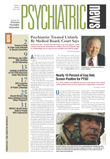A Maryland court has vindicated former APA President Harold Eist, M.D., in his suit against a state medical board.
The suit centered on the state board's right to obtain the medical records of a mother and her children whom Eist was treating and its punishment of him for not complying with its demand in what it determined was an appropriate timeframe.
On March 7 Judge Durke Thompson of Montgomery County (Md.) Circuit Court ordered the reprimand of Eist levied by the Maryland Board of Physicians rescinded and all charges dismissed.
This was the third time a court ruled in Eist's favor in the four years since the actions that prompted the case began to unfold (Psychiatric News, November 4, 2005; April 18, 2003).
The judge said he wondered if the physician board's unfair actions against the psychiatrist signified that they were “out to get Dr. Eist.” The board pursued the sanctions because, it claimed, Eist did not cooperate in an investigation of charges filed against him with the board.
The charges, which involved failure to meet the standard of care, were filed by the husband in a couple mired in a bitter divorce and child-custody proceeding. After the filing, the board demanded that Eist, who was treating the wife and her two children, turn over her treatment records and those of the children, so they could investigate the husband's charges that his wife and children were being overmedicated by Eist. Both the wife and the children's legal representative in the proceedings would not agree to do so. Without their permission, Eist maintained that complying with the board's demand to have their records forwarded posed a serious ethical dilemma for him.
Eist asked for the physician board's guidance on how he should proceed in light of his ethical concerns about complying with its demand, but seven months later its only response was to impose sanctions.
The board fined Eist $5,000 for noncompliance and issued a reprimand.
Eist eventually released the records to the board after the wife and the children's legal representative withdrew their opposition. In 2003 an administrative law judge ruled in Eist's favor regarding the initial reluctance to breach patient confidentiality and issued a strong rebuke to the board over its actions and refusal to drop its pursuit of the case.
The Montgomery County Circuit Court then got the case and upheld the ruling of the administrative law judge, but again the board would not drop it. Eist appealed the board's refusal to cancel the sanctions to that court, and last month learned that his appeal had succeeded, with the judge emphasizing the importance of confidentiality in psychiatric treatment.
Eist's lawyer, Alfred Belcuore, said he was “delighted that Judge Thompson saw the case for what it has been—an effort to overcome the privacy that patients deserve if their mental health care is to be effective.” The judge sent the unambiguous message, he added, that the Maryland board “exceeded its authority in prosecuting Dr. Eist.” He noted that despite the “unequivocal” nature of the judge's ruling against the board, it may still appeal the decision.
Tom Keech, the general counsel for the physician board, told Psychiatric News in mid March that the board had not met since Thompson's decision and thus had not made a decision about whether to appeal. The system the judge expects the board to follow in handling investigations of complaints against physicians, Keech said, is “unworkable.”
Eist's case has also had an impact on Maryland legislators. In February the state Senate passed a bill (SB 142) that stemmed from the case and specifies when a physician or other provider must disclose certain patient records without authorization to the state medical board. In cases in which a third party files a complaint that requires access to medical records, it would give the patient 30 days in which to go to court to try to have the subpoena for medical records quashed. Only if the court disagreed with the patient's request would the treating physician have to turn over the records. The bill was introduced by three state senators after discussions with representatives of the Washington Psychiatric Society. At press time, the bill, which is also being supported by the Maryland Psychiatric Society and Maryland State Medical Society, was before the House Health and Government Affairs Committee.
In an e-mail to his supporters soon after the March ruling, Eist, who spent approximately $300,000 of his own money in the case, said that “fighting for and preserving our ethics is hard and costly but is something we must do. .if we are to provide the high-quality care patients deserve and require. We have won a battle, but the war continues.” ▪

